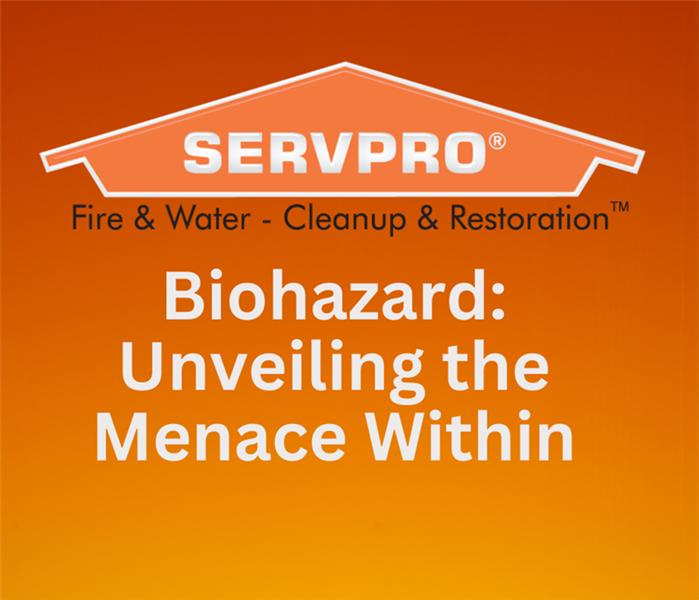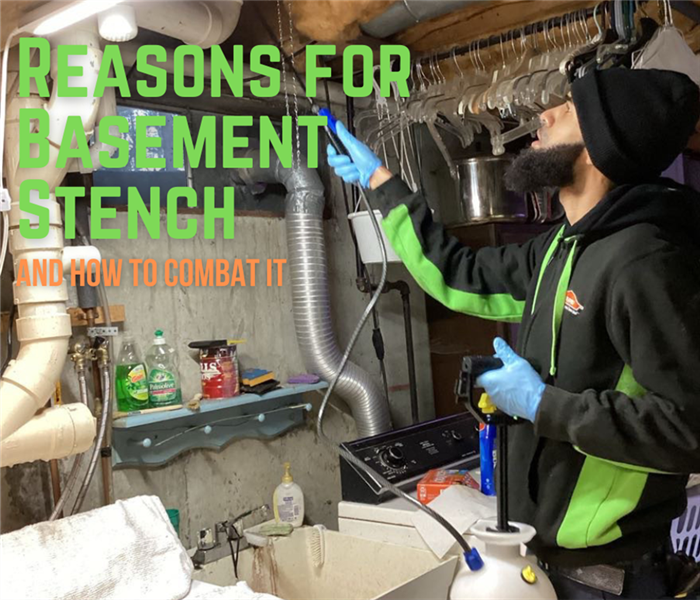Recent Biohazard Posts
Biohazard: Unveiling the Menace Within
7/7/2023 (Permalink)
 It is essential to shed light on biohazards, their diverse forms, and the importance of effective management to ensure our well-being.
It is essential to shed light on biohazards, their diverse forms, and the importance of effective management to ensure our well-being.
In our modern world, we are constantly exposed to potential threats, some of which remain unseen, yet capable of causing harm. Among these hidden perils, biohazards stand as a significant risk to both human health and the environment. Defined as biological agents or substances that pose a threat to living organisms, biohazards have garnered increasing concern in recent times. It is essential to shed light on biohazards, their diverse forms, and the importance of effective management to ensure our well-being remains safeguarded.
Understanding Biohazards: Biohazards encompass a wide array of hazardous agents, including bacteria, viruses, toxins, fungi, and other biological substances. These potential threats can be found in various environments such as laboratories, hospitals, industrial settings, and even natural ecosystems. What makes biohazards particularly dangerous is their capacity to cause infections, diseases, and severe health complications in both humans and animals.
Types of Biohazards: Biohazards manifest in several forms, each presenting unique challenges and risks. Here are some common types of biohazards:
Biological Agents: This category includes pathogenic microorganisms such as bacteria, viruses, fungi, and parasites. Well-known examples of biohazards include Salmonella, E. coli, HIV, influenza, and anthrax. These agents can spread through direct contact, droplets, contaminated food or water, or via vectors like mosquitoes.
Biomedical Waste: Medical facilities generate significant amounts of hazardous waste, including used needles, blood-soaked materials, contaminated sharps, and pharmaceutical waste. Improper handling or disposal of these materials can lead to the spread of infections and endanger public health.
Genetically Modified Organisms (GMOs): While GMOs have their benefits in agriculture and medical research, their uncontrolled release or mishandling can have unintended consequences. These genetically altered organisms may disrupt ecosystems and pose risks to native species if not properly managed.
Chemical Agents: Biohazards can also take the form of toxic chemicals or toxins produced by organisms. Pesticides, heavy metals, and industrial pollutants, when released into the environment, can contaminate air, water, and soil, endangering human and animal life.
Managing Biohazards: Effectively managing biohazards is crucial for protecting public health, preserving the environment, and preventing the spread of diseases. Here are some key aspects of biohazard management:
Risk Assessment and Prevention: Identifying potential biohazards, evaluating their risks, and implementing preventive measures are vital. This includes providing proper training and education for individuals working with biohazardous materials, implementing safety protocols, and enforcing regulations to minimize exposure and transmission.
Proper Handling and Disposal: Safe handling, storage, and disposal of biohazardous materials are of utmost importance. Strict adherence to guidelines, such as using personal protective equipment (PPE), following decontamination procedures, and employing specialized waste disposal methods, helps minimize the risks associated with biohazards.
Research and Development: Ongoing scientific research plays a crucial role in understanding biohazards, their behavior, and developing effective countermeasures. Investing in research and development of vaccines, antiviral drugs, and diagnostic tools aids in the prevention and management of biohazard outbreaks.
Public Awareness and Education: Educating the general public about biohazards, their potential risks, and proper precautions fosters a culture of safety and responsibility. Awareness campaigns, public health initiatives, and educational programs can empower individuals to protect themselves and their communities.
Biohazards pose a significant threat to human health, the environment, and overall well-being. Understanding the various types of biohazards, implementing effective management strategies, and promoting awareness are crucial steps toward mitigating these risks.
If you require cleanup and restoration services for residential or commercial buildings affected by fire, mold, water, or storm damage, SERVPRO Of Foxborough is the #1 Choice. They serve Bellingham, Foxborough, Franklin, Millis, Norfolk, Wethersfield, and Wrentham, MA.
How To Get Rid Of Odor
2/15/2023 (Permalink)
 It is important to take action as soon as possible to prevent the odor from getting worse and spreading to other areas of your home.
It is important to take action as soon as possible to prevent the odor from getting worse and spreading to other areas of your home.
Odors can be unpleasant and difficult to remove, especially if they are deeply embedded in fabrics or other materials. Fortunately, there are several effective methods for odor removal that can help you get rid of unwanted smells in your home.
- Ventilate the area: One of the easiest and most effective ways to remove odors is to ventilate the area. This can be done by opening windows and doors to let in fresh air, using a fan to circulate the air, or simply turning on your air conditioning or heating system to help remove any stagnant or stale air.
- Baking soda: Baking soda is a natural deodorizer that can help remove odors from a variety of surfaces. Simply sprinkle a generous amount of baking soda onto the affected area and let it sit for several hours or overnight. Then, vacuum or sweep up the baking soda and any residual odor.
- White vinegar: White vinegar is another effective natural deodorizer that can help remove stubborn odors. Mix equal parts white vinegar and water in a spray bottle and apply to the affected area. Let it sit for several hours, then wipe clean with a damp cloth.
- Activated charcoal: Activated charcoal is a powerful odor absorber that can help eliminate even the strongest of smells. Simply place a few pieces of activated charcoal in a container and leave it in the affected area for several hours or overnight. The charcoal will absorb the odor and leave the air smelling fresh and clean.
- Enzyme cleaners: Enzyme cleaners are specially designed to break down organic matter and eliminate odors. They can be used on a variety of surfaces, including carpets, upholstery, and clothing. Simply apply the enzyme cleaner to the affected area, let it sit for several hours, then wash or rinse as directed.
- Professional cleaning: If all else fails, it may be time to call in the professionals. Professional cleaning services have the tools and expertise to remove even the toughest odors, whether they are in your carpets, furniture, or air ducts. They can also help identify the source of the odor and provide advice on how to prevent it from returning in the future.
Whether you opt for natural remedies or professional cleaning services, it is important to take action as soon as possible to prevent the odor from getting worse and spreading to other areas of your home.
SERVPRO of Foxborough is your premier choice for fire damage and restoration. Our teams are ready to respond 24 hours a week, any day of the year. When you bring us on the job our team of licensed contractors and certified technicians will work collaboratively with you throughout the duration of the project. They will keep you updated on the project's status and ensure that your expectations are met. We will help you to move forward and make it “Like it never even happened” for all of your fire damage.
Reasons For Basement Stench
12/20/2022 (Permalink)
 Odor from a basement can be from a few different reasons
Odor from a basement can be from a few different reasons
The reasons a basement may have a stench are extensive. Figuring out the problem can stop the odor, and allow for a fix before the issue becomes greater. Here are some of the most common reasons that basements smell bad, and how you can take action against the stench.
1. The Ground is Wet
One reason for an odor from a basement is that the ground is wet. Make sure that your sump pump is working properly to combat this issue from the water getting in the basement an growing mold. To check if your sump pump is working, open up your sump pump access door and look inside, and check if there is standing water or if the pump has been disconnected. In this case, secure it back into place.
If this does not help resolve the ground moisture problem, look at other possible causes, such as cracks in foundation walls and floors; leaks from pipes; water damage from flooding caused by heavy rain or ice dams; or mold growth from to large moisture levels in clothes, closets, or bathrooms.
2. Poor Air Flow
Another reason for a basement stench is poor air flow. A basement is a closed space, which means that if you don’t have enough ventilation in your home, the air will become stagnant and begin to smell like mold or mildew. By ensuring that there are no blocked vents from insulation or water damage, this can be prevented.
Other factors that may contribute to this problem as well include dirt, dust and debris build up on walls and on the floor. This can create odor issues because this material needs to be cleaned out regularly in order for everything else inside your home, such as furniture, to not get ruined.
3. Sewer Gases
Sewer gases are caused by decomposing organic material in your home, and they can be a health risk to you and your family. Sewer gas smells like rotten eggs because it contains sulfur-based compounds. The same foul odor that hits you when you open a can of stinky cheese or an old pizza box is also present in your sewer system.
Sewer gas corrodes metal pipes and causes basement walls to mold or rot due to moisture buildup caused by condensation on them from moist air entering your home through cracks or gaps around windows or doors (or perhaps even through the foundation).
When sewer gases enter at the main stack—the pipe that brings fresh air into your home—they escape into other parts of the house rather than being vented back outside as they should be if there were no leaks anywhere else along its path (like under floors). This means that any openings between rooms could be letting these harmful gases into other areas where they'll linger until someone opens up doors/windows/ventilators again so they can vent outside instead!
Your basement could smell for a number of reasons. One of the main reasons for a smelly basement is water entering where it shouldn’t. If you experience water damage or need odor removal in your home or commercial business, call us today!
 It is essential to shed light on biohazards, their diverse forms, and the importance of effective management to ensure our well-being.
It is essential to shed light on biohazards, their diverse forms, and the importance of effective management to ensure our well-being.




 24/7 Emergency Service
24/7 Emergency Service

